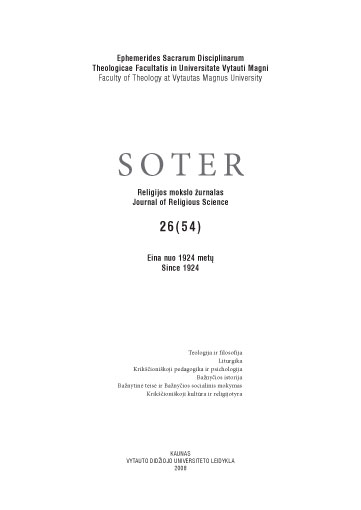Šeimos vaidmuo judėjimo sutrikimų turinčių vaikų socialiniams gebėjimams
THE ROLE OF THE FAMILY IN DEVELOPING SOCIAL SKILLS AMONG CHILDREN WITH MOVEMENT DISABILITIES
Author(s): Genutė Gedvilienė, Zita Baužienė, Zita DarbutaitėSubject(s): Christian Theology and Religion
Published by: Vytauto Didžiojo Universitetas
Keywords: judėjimo sutrikimai; socialiniai gebėjimai; šeima; savirealizacijos galimybė; movement disabilities; social skills; family; self-realization.
Summary/Abstract: A family is one of the oldest and most important institutions for child socialization, as the child experiences here the first interactions that have a special role in determining life quality for a man as a personality. A family is the place where a child has a shelter from hostile and stressful world (G. Colombero, 2001; I. Jonutytė, 2007). However, the authority of the family in the modern society is destroyed, and this encouraged transformation of the family model by increasing the number of incomplete families. Children from incomplete families lose the guarantee of safe and harmonized development of their personality; therefore, socialization process becomes destroyed. Families bringing up children with movement disabilities experience not only consequences of transformation of the family model, but also influx of causes brought by the child‘s disability: ignorance of family friends, over politeness, rejection, irony, and the like. This reason causes the search for new friends who are sometimes of the same fate, as people feel understood when having similar problems. Such family experiences crises when the stress cased by disability increases, and the results of this can be divorce. If there are more children in the family, they also experience a lot of stress and tension. How can we help such a family bringing up a child with movement disabilities? The child who has movement disabilities will always need parental and other family members help. The most important is that such child understands that he troubles other family members. Te aim of this research is to determine the role of the family bringing up children with movement disabilities in development of their social skills. The following tasks are formulated to achieve this aim: - To reveal social situation of the family bringing up a child with movement disabilities; - To clarify the role of the family bringing up children with movement disabilities in development of their social skills. - Research object is the role of the family bringing up children with movement disabilities in development of their social skills A survey using a questionnaire was performed for empirical research. The research is based on Christian social teaching conception that is based on two attitudes towards a man by the Church: individuality (with the focus on human dignity) and social ability (based on interrelation among men in the society and community). The basis for the Christian social teaching is the basic principles of the church: common wealth and solidarity that proclaim the support of all citizens, the state and the society (J. Hoffner, 1996; V. Kazlauskas, 1993). The aim of the empirical research was to clarify which social skills are missing among children with movement disabilities in families. The majority of parents identified that children with movement disabilities are able to understand and express their emotions, and they know how to communicate with adults. However, it should be noted
Journal: SOTER: religijos mokslo žurnalas
- Issue Year: 54/2008
- Issue No: 26
- Page Range: 71-85
- Page Count: 15
- Language: Lithuanian

